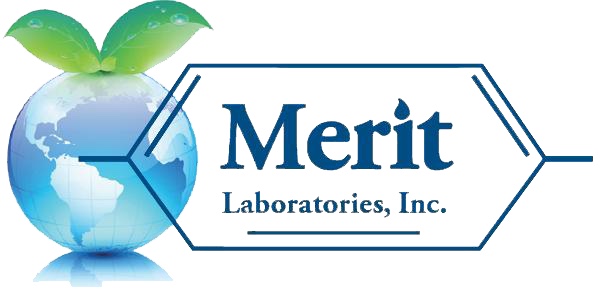While testing for PFAS in water sample matrices captures most of the attention, the analysis of soil for PFAS is growing in importance. Environmental scientists are working hard to identify and investigate the presence of PFAS contamination in soil. Soil site investigation efforts are increasing in importance as regulatory agencies and communities are looking to identify the sources of PFAS contamination.
To support our clients’ site investigation efforts, Merit Laboratories performs the analysis of soil samples for PFAS using analytical method ASTM D7968-17. The method, developed by the U.S. EPA Region 5 Chicago Regional Laboratory, is an LC-MS-MS method specific for PFAS in soil. Soil samples are prepared for analysis with a solvent extraction prior to analysis.
The most common list of PFAS compounds analyzed in soil includes:
Perfluorobutanoic Acid (PFBA)
Perfluoropentanoic Acid (PFPeA)
4:2 Fluorotelomer Sulfonic Acid (4:2 FTSA)
Perfluorohexanoic Acid (PFHxA)
Perfluorobutane Sulfonic Acid (PFBS)
Perfluoroheptanoic Acid (PFHpA)
Perfluoropentane Sulfonic Acid (PFPeS)
6:2 Fluorotelomer Sulfonic Acid (6:2 FTSA)
Perfluorooctanoic Acid (PFOA)
Perfluorohexane Sulfonic Acid (PFHxS)
Perfluorohexane Sulfonic Acid - Linear (PFHxS-LN)
Perfluorohexane Sulfonic Acid - Branched (PFHxS-BR)
Perfluorononanoic Acid (PFNA)
8:2 Fluorotelomer Sulfonic Acid (8:2 FTSA)
Perfluoroheptane Sulfonic Acid (PFHpS)
Perfluorodecanoic Acid (PFDA)
N-Methyl Perfluorooctane Sulfonamidoacetic Acid (N-MeFOSAA)
N-Ethyl Perfluorooctane Sulfonamidoacetic Acid (EtFOSAA)
Perfluorooctane Sulfonic Acid (PFOS)
Perfluorooctane Sulfonic Acid - Linear (PFOS-LN)
Perfluorooctane Sulfonic Acid - Branched (PFOS-BR)
Perfluoroundecanoic Acid (PFUnDA)
Perfluorononane Sulfonic Acid (PFNS)
Perfluorododecanoic Acid (PFDoDA)
Perfluorodecane Sulfonic Acid (PFDS)
Perfluorotridecanoic Acid (PFTrDA)
Perfluorooctane Sulfonamide (FOSA)
Perfluorotetradecanoic Acid (PFTeDA)
Sample collection for PFAS (polyfluoroalkyl substances) requires an experienced environmental professional to eliminate and reduce potential field issues that could impact analytical test results. To support our clients’ PFAS sample collection efforts, Merit provides sample collection kits to ensure the proper sample volume is collected, along with appropriate preservatives and sample containers.
Here are the standard guidelines for the PFAS soil sample collection kits provided by Merit:
Soil PFAS Sample Specifications
Method: ASTM D7968-17
Sample Volume: Minimum 20 grams
Preservative: Cooled < 10° C
Holding Time: 28 Days
Samples should be chilled during shipment and must not exceed 10° C. For method compliance, the sample temperature must be at or below 10° C upon sample receipt by the laboratory. According to the EPA, samples that are significantly above 10° C at the time of sample collection, may need to be iced or refrigerated in order to chill them prior to shipping, allowing the samples to be shipped with sufficient ice to satisfy the temperature requirements.
There are also field sampling guidelines to consider and follow associated to ensure PFAS sampling is performed properly. A few of these guidelines include:
When performing sample collection for multiple parameters or tests, PFAS sampling must be performed first.
Clothing worn in the field during sample collection should not be treated with fabric softener, fabric protector, stain resistant chemicals, or insect resistant chemicals. Tyvek-coated or Gore Tex products must not be used in the field.
As a precaution, on the day of sample collection, field personnel should not use cosmetics, hand creams, moisturizers, dental floss and plaque removers, and most types of sunscreen and insect repellants.
During field collection, avoid using recycled or waterproof/treated paper, plastic clipboards, binders, markers, and adhesive paper products (e.g. Post-It notes).
Food and beverages coming into contact with pre-packaged containers, fast food wrappers and containers, aluminum foil, and non-stick cookware and containers should be avoided.
Merit is Michigan’s PFAS environmental laboratory, analyzing soil, wastewater, groundwater, drinking water, and other sample matrices at our laboratory in East Lansing, Michigan. Merit is certified for the analysis of PFAS by ISO/IEC 17025. Analytical method certification for PFAS includes drinking water by EPA 537 rev. 1.1 and wastewater | groundwater | surface water by ASTM D7979 with Isotopic Dilution. Please contact Merit Laboratories for assistance on your PFAS testing needs.

